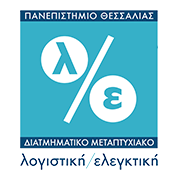Auditing II
- GENERAL
| SCHOOL | SCHOOL OF ECONOMICS AND BUSINESS | ||||
| SECTION | DEPARTMENT OF ECONOMICS AND DEPARTMENT OF ACCOUNTING & FINANCE | ||||
| LEVEL OF STUDIES | POSTGRADUATE LEVEL | ||||
| COURSE CODE | MSC0204 | SEMESTER OF STUDY | 3 | ||
| COURSE TITLE | AUDITING II | ||||
|
INDEPENDENT TEACHING ACTIVITIES |
WEEKLY TEACHING HOURS | CREDIT UNITS | |||
| LECTURES | 3 | 8 | |||
|
TYPE OF COURSE |
REQUIRED |
||||
| PREREQUISITE COURSES: | NO | ||||
| LANGUAGE OF TEACHING AND
EXAMINATION: |
GREEK / ENGLISH | ||||
| THE COURSE IS OFFERED TO ERASMUS STUDENTS | NO | ||||
| ELECTRONIC COURSE PAGE (URL) | https://eclass.uth.gr/ | ||||
| Upon successful completion of the course students will acquire:
• Specialised knowledge in the application of the Standards and the control procedures of the financial statements. • Specialised and comprehensive knowledge of accounting operations and their control. • Skills in analysing and synthesising information from the financial statements using Auditing Standards for the compilation of the audit report. • Capacity building related to the drafting of the audit report and the drafting of the audit programme in enterprises and institutions. • Skills and abilities to detect fraud and crime or mishandling (accounting, financial and administrative) and reporting. |
| Learning Outcomes |
- LEARNING OUTCOMES
| • Search, analysis and synthesis of data and information, using both the
necessary technologies • Decision-making • Autonomous work • Teamwork • Working in an international environment • Working in an interdisciplinary environment • Generating new research ideas • Respect for the natural environment • Demonstrate social, professional and ethical responsibility • Promoting free, creative and inductive thinking |
| General skills |
- COURSE CONTENT
The course aims to familiarize the student with the basic detection tools information, conclusions and diagnosis on the situation and its implications
specific transactions or accounting treatments on the firm’s/entity’s image of financial and administrative efficiency and effectiveness. More specifically, the objectives of the course are:
- Linking the organisational/management structure to the audit Detection
problems and improvements.
– Methodology for implementing new auditing and accounting systems.
- New approaches to auditing and the link between auditing and finance
science.
– Fraud investigation methodology. Case studies.
- Presentation of current trends in Greek and International Auditing Standards in the formulation of audit findings, specialised audits and international standards
audit in private and public sector auditing.
More specifically, during the teaching of the course the following modules will be covered:
- Net Position Audit, Internal, External and Tax Audit, International Auditing Standards, practical applications-examples
- Audit of Long and Short Term Liabilities, Internal, External and Tax Audit, International Standards on Auditing, practical applications
- Revenue Audit, Internal, External and Tax Audit, International Standards
Control, practical applications
- Expense Control, Internal, External and Tax Audit, International Standards
Control, practical applications
- Audit of Staff Remuneration and Expenses, Internal, External and Tax Audit, International Auditing Standards, practical applications
- Audit Reports, Internal, External and Tax Audit, International Standards
Control, practical applications
- IPE 200 – 299, Purpose of the Audit of Financial Statements and Auditor’s Practical Applications – Examples. (Audit Cases).
| • IPE 300 – 399, Audit Risk Assessment and Audit Planning. Practical Applications – Examples. (Audit Cases).
• IPE 500-599, Performance of audit work and audit documentation. Practical Applications – Examples. (Audit Cases). • AP 600 -699, Using the work of other auditors or third parties. Practical Applications – Examples. (Audit Cases) • IPE 700 – 799, Audit report and diversification of the auditor’s opinion. Practical Applications – Examples. (Audit Cases). • PPI 2600-2699, Assignments for the review of financial statements. Practical Applications – Examples. (Audit Cases) • Case studies and new developments in auditing |
- TEACHING and LEARNING METHODS – EVALUATION
| METHOD OF DELIVERY | On Site & Distance learning – Hybrid room | |||
| USE OF INFORMATION AND COMMUNICATION TECHNOLOGIES | Use of a hybrid room that includes a large
a wall-mounted screen on which the participants are presented remotely. The connection to the course is made through the Microsoft Teams software, in which a camera is connected to the course. in the room is recorded and illustrated by the teacher. The attendance of the course is also done with the use of the Wacom digital pen, which ensures the interactivity of the lesson with notes that appear directly on the students’ screen.
In addition, slides are projected, use of the an asynchronous education platform for the posting of course materials, students’ assignments and communication between lecturers and students, search for electronic journals and resources. |
|||
| ORGANISATION OF TEACHING | Activity | Semester Workload | ||
| Lectures | 36 | |||
| Study, preparation and
presentation Activities |
146 |
|||
| Study and analysis of the literature
(preparation of lectures & exams) |
55 |
|||
| Final written examination | 3 | |||
| Total Course |
240 |
|||
| STUDENT ASSESSMENT | The evaluation is carried out in Greek or in English and consists of:
I) By written final examination (80%) Includes: – Multiple choice questions – Role and stakeholder analysis in a short case study |
|||
| – Solving problems related to quantitative data of a project time, cost
– Comparative evaluation of theory elements II) Presentation of Individual Work (20%) The paper deals with the different approaches of the six sigma and belief function methodologies for discovery and identification of discrepancies.
The assessment criteria are made known to the students during the course and are indicated in the e-learning system. |
- RECOMMENDED-BIBLIOGRAPHY
| – Suggested Bibliography:
– Alifantis G. (2011) Auditing, Pamisos Publications, Athens. – Antle R. (1984) Auditor Independence, Journal of Accounting Research, Spring, pp. 1-20. – Βahram S. (2007) Auditing: an international approach, 4th ed., Pearson Prentice Hall, – London, U.K. – Beasley, M., Buckless, F., Glover S. And Prawitt D. (2007) Auditing Cases: An Interactive Learning Approach, 3rd ed., Pearson Prentice Hall, London, U.K. – Carmichael D. and Swieringa R. (1968) The Compatibility of Auditing Independence and Management Services – An Identification of Issues, The Accounting Review, October, pp.697- 705. – International Federation of Accountants (IFAC) (2009) Handbook of International Auditing Standards and Quality Assurance Standards, Accounting Standards and Audit Committee, SOE-L. – Dauber, N. (2009) The Complete Guide to Auditing Standards and Other Professional Standards for Accountants, John Wiley & Sons Inc. – Hayes, R., Dassen, R., Schilder, A. and P. Wallage (2004) Principles of Auditing, An Introduction to International Standards on Auditing, 2nd Edition, Prentice Hall. – Karamanis, K. (2008) Synchronic Auditing, OPA Publications. – Kazantzis Ch. (2006) Auditing and Internal Audit, Business Plus Publications, Athens. – Loumiotis, V. (2013) Practical Examples of Applied Auditing of – Business, IESOEL Publication, Athens – Loumiotis, V. and Tzifas V. (2012) International Auditing Standards, IESOEL Publication, Ath |
ens. |
||
|
– |
– Loumiotis, V. (2011) International Auditing Standards, IESOEL Publication, Athens. Negakis I.Ch. and Tahinakis P. (2013) Contemporary Issues in Auditing and Internal Audit, According to International Auditing Standards, Diplografia Publications, Athens. Mautz R. and Sharaf H., (2002) The Philosophy of Auditing, American Accounting Association, USA. |
||
|
– |
|||
– Meigs W., Meigs R. and Larsene J., (1984) Auditing, Papazisis Publications, Athens.
| – Ndzanatos D. (2009) Control as a mechanism of negative entropy, vol. A-B, Publications.
Kastaniotis, Athens. – Sherer M. and Kent D., (2008) Auditing and Accountability, PCP Paul Chapman Publishing Ltd |
You may also like
Information Systems in Accounting
(1) GENERAL SCHOOL SCHOOL OF ECONOMICS AND BUSINESS SECTION DEPARTMENT OF ECONOMICS AND DEPARTMENT OF ACCOUNTING & FINANCE LEVEL OF STUDIES POSTGRADUATE LEVEL COURSE CODE MSC0207 SEMESTER OF STUDY 3 …
Tax Accounting
GENERAL SCHOOL SCHOOL OF ECONOMICS AND BUSINESS SECTION DEPARTMENT OF ECONOMICS AND DEPARTMENT OF ACCOUNTING & FINANCE LEVEL OF STUDIES POSTGRADUATE LEVEL COURSE CODE MSC0206 SEMESTER OF STUDY 3 COURSE …
Management Accounting II
GENERAL SCHOOL SCHOOL OF ECONOMICS AND BUSINESS SECTION DEPARTMENT OF ECONOMICS AND DEPARTMENT OF ACCOUNTING & FINANCE LEVEL OF STUDIES POSTGRADUATE STUDY PROGRAMME COURSE CODE MSC0203 SEMESTER OF STUDY 3 …

